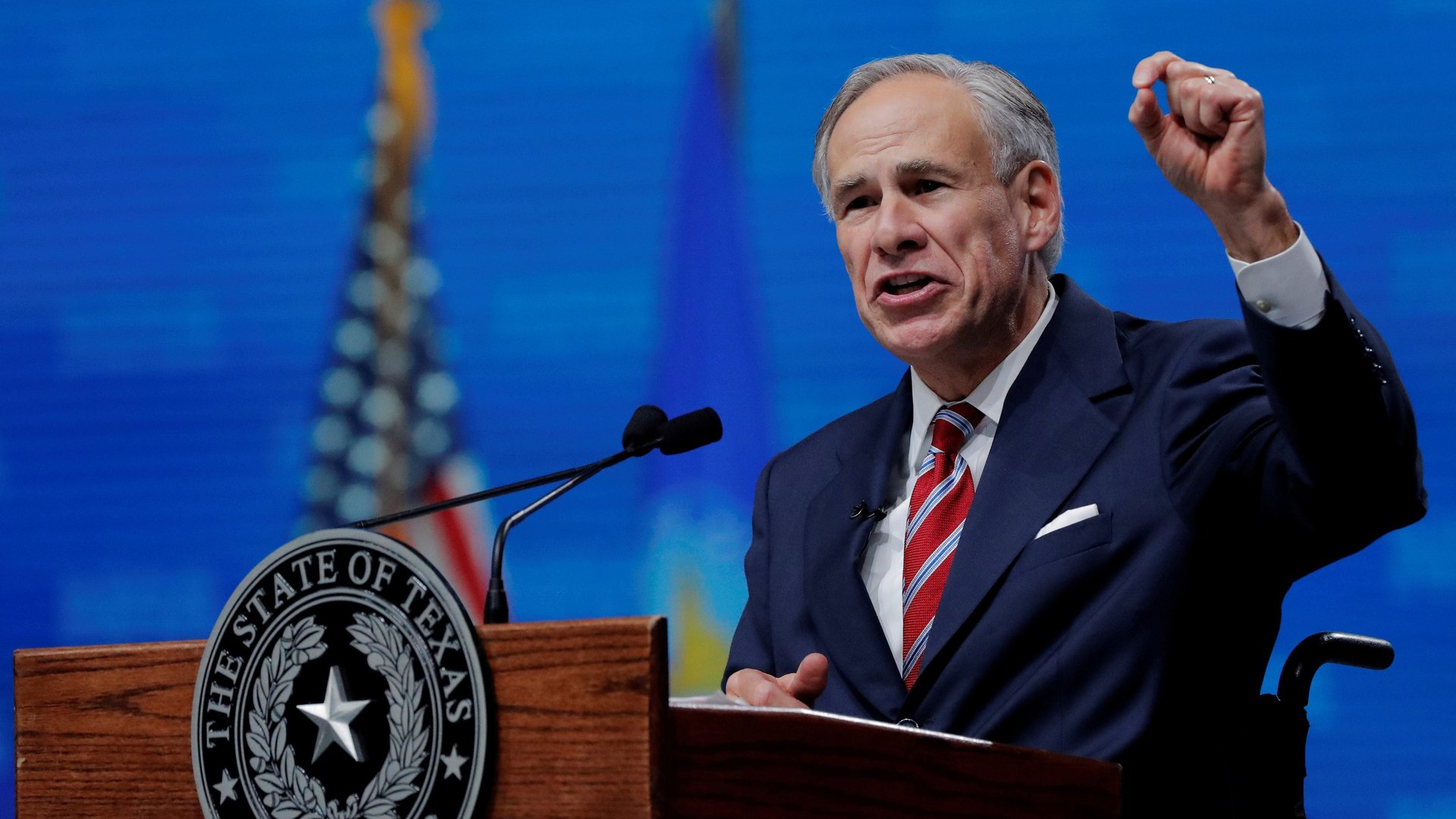Texas governor bans all vaccine mandates
Good morning, Quartz readers!


Good morning, Quartz readers!
Was this newsletter forwarded to you? Sign up here. Forward to the friend who is planning a Squid Game Halloween costume.
Here’s what you need to know
The governor of Texas banned all vaccine mandates. Republican Greg Abbott signed an executive order that, amongst other things, prevents private companies from requiring employees to get jabbed.
The US House votes to temporarily raise the debt limit. The $480 billion increase cleared the Senate last week.
Evergrande keeps missing payments. The struggling Chinese property giant defaulted on bondholders for a third time in just three weeks.
The International Monetary Fund (IMF) is keeping its controversial managing director. Krystalina Georgieva is accused of manipulating China’s business ranking when she was at the World Bank.
Oil prices closed above $80 for the first time since 2014. They’ll likely outpace copper this year, with production limited by global supply issues and emissions curbs.
Southwest Airlines is canceling thousands of flights. The US-based airline blamed a staffing crunch, issues with air traffic control, and weather.
What to watch for
The IMF takes on two of the buzziest themes in finance when it releases its semi-annual financial stability report today. It’s more exciting than it sounds—the October update will cover:
📈 The promise and peril of crypto assets. The IMF points out that consumers can get burned by hackers, while anonymity and a dearth of global standards are a risk to financial integrity. The institution also notes that stablecoins—some of which are (meant to be) pegged to the US dollar—could spur people to flee their local currencies in emerging markets.
🌳 Clean, green, and possibly mean data. When it comes to transitioning to a green economy, policymakers must strengthen the financial sector’s climate data, make sure these markets are regulated properly, and watch out for greenwashing, the IMF says. Regulators must also run stress tests to look out for financial stability risks stemming from climate change.
It’s too late to ship goods to the US in time for Christmas
US companies hoping for goods to be delivered in time for Christmas are facing a nail-biter of a holiday season, as the short sales window collides with a global supply chain snarled from the ports of China, over the Pacific, through the US ports, and into the country’s faltering network of inland delivery routes.
How companies deal with the delays will depend on consumer response. But with time and space at such short supply, items will arrive late, and some companies will inevitably be de-prioritized, or be forced to pay premiums to jump the line.
33.6%: Reliability, a measure of on-time arrivals for shipped goods, in August—a record low
92 days: Average shipping time for parts, according to the Institute for Supply Management
74 days: Time left until Christmas
1 million: Number of packages FedEx delivered late for Christmas 2020
9-13%: Estimated increase in US holiday sales this year
🎧 Introducing the Quartz Obsession podcast
We’re launching the Quartz Obsession podcast with not one, but two thought-provoking episodes:
🎲 Randomness: The global economy needs true randomness to encrypt messages and make sure elections are honest, but humans and computers alike are really bad at generating it. So we turn to natural sources like seismic waves, radioactive decay, and lava lamps (yes, lava lamps) to generate it for us.
💵 Cash: It’s anonymous, it’s stable, and it’s accepted pretty much everywhere. And despite the rise of mobile payments and the ubiquity of credit cards, it’s still moving everything around us. We talk about the pros and cons of cash in a world increasingly dominated by mobile payments, and try to figure out if cash is here to stay.
Click here to listen on our website. Subscribe wherever you get your podcasts, whether that’s Spotify, Apple, or Google.
Sponsored by American Express
Handpicked Quartz
Surprising discoveries
Prince Charles’s car has taste. Surplus English white wine and whey from cheese-making fuel his Aston Martin in a “quaint” decarbonizing way.
Killer whales are swimming closer to Vancouver’s shore. It’s OK—scientists say it’s a sign of the ecosystem getting back to normal.
There’s a bat in New Zealand’s bird of the year competition. Not only are mammals not birds, as critics helpfully point out, but has anyone considered these mammals are vampires in disguise? 🧛♀️
Fake lightning could end farm stench. Tests show blasting manure with plasma can break up its pollutants and stank.
A 12,300-year-old hearth holds a new history of tobacco use. Four charred seeds may push back humans’ first use of tobacco by thousands of years.
Our best wishes for a productive day. Send any news, comments, caviar-based motor oil, and regular human bartenders to [email protected]. Get the most out of Quartz by downloading our iOS app and becoming a member. Today’s Daily Brief was brought to you by Hasit Shah, John Detrixhe, Aurora Almendral, Morgan Haefner, Susan Howson, and Liz Webber.